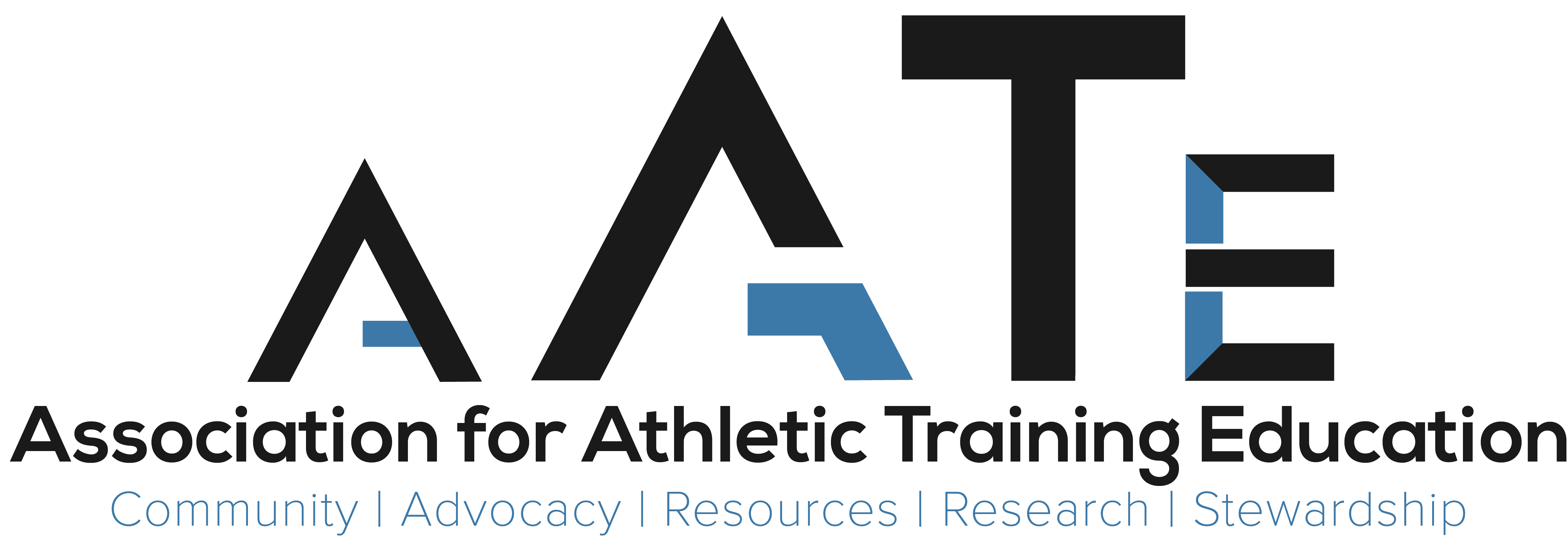Abstract Submission
2024 Association for Athletic Training Education Symposium
Advancing Athletic Training Education
Location: Boise ID
Call for Abstracts (Oral Presentations)
A call for abstracts is being issued for the 2024 Association for Athletic Training Education (AATE) Symposium. The conference theme is Advancing Athletic Training Education. AATE and non-AATE members are invited to submit abstracts.
Accepted abstracts will be orally presented in a rapid-fire style on Friday and Saturday at the symposium and published in the Clinical Practice of Athletic Training: A Journal of Practice-Based, Outcomes, and Action Research.
Abstracts are due by December 15, 2023, and we will send a notification letter out within two weeks. Reviewer guides for abstracts and educational technique abstracts can be found here.
All abstracts will undergo blinded peer review. Once submitted, abstracts will be delivered to the email address of Elizabeth Lipke, <executivedirector@aated.org> where they will be blinded for peer-review.
There is a $35 Fee for all submissions for AATE members and non-members. All proceeds from abstract submissions will support research initiatives for athletic training educators.
Individuals may submit only one abstract as presenting author but may submit unlimited abstracts as a secondary author. All abstracts will undergo blinded peer review.
All submitted abstracts must be original work and not previously presented in oral, poster, or electronic format. Exceptions to this restriction are limited to athletic training organizations’ state and district meetings if the submitted abstract has not been and will not be published in a journal before the 2024 AATE Symposium.
AATE and non-AATE members are encouraged to submit abstracts in any area of athletic training education and/or athletic training education research, including educational techniques and action research. To capture a broad array of scholarship, please use the following definitions.
*Scholarship of Teaching: The Scholarship of Teaching encompasses scholarly activities that are directly related to pedagogical practices. Such scholarship seeks to improve the teaching and advising of students through the discovery, evaluation, and transmission of information about the learning process. The Scholarship of Teaching must be distinguished from teaching itself. It involves the disciplined discovery, evaluation, and transmission of information about the teaching and learning process.
*Scholarship of Discovery: The Scholarship of Discovery involves systematic modes of inquiry designed to identify problems, state hypotheses, collect data, test hypotheses, and develop conclusions concerning the solution of problems.
*Scholarship of Application: The Scholarship of Application encompasses scholarly activities which seek to relate the knowledge in one's field to the affairs of society. Such scholarship moves toward engagement with the community beyond academia in a variety of ways, such as using social problems as the agenda for scholarly investigation, drawing upon existing knowledge for the purpose of crafting solutions to social problems, or making information or ideas accessible to the public.
*Scholarship of Integration: The Scholarship of Integration involves making connections across the disciplines, placing the specialties in larger context, the illumination of data in a revealing way. Integration creates new knowledge by bringing together otherwise isolated knowledge from two or more disciplines or fields this creating new insights and understanding.
*The above definitions of scholarship are adapted from the following seminal reports
Boyer, E. (1990). Scholarship Reconsidered: Priorities of the Professoriate. Princeton, NJ: The Carnegie Foundation for the Advancement of Teaching.
Glassick, C. Huber, M. & Maeroff, G. (1997). Scholarship assessed: Evaluation on the professoriate. San Francisco, C.A.: Jossey-Bass
To submit an abstract:
- Format your abstract per the formatting guidelines below and submit it as a Word document.
- Enter the required information below (authors names, email, institution)
- Upload your abstract as a Word document
- Pay the $35 fee
Formatting Guidelines
- Provide the paper's title or project starting at the top left margin.
- On the next line, provide the names of all authors, with the author who will make the presentation listed first as the lead author. Enter the last name, then initials (without periods), followed by a comma, and continue the same format for all secondary authors (if any), ending with a colon.
- On the same line following the colon, indicate the institution's name (including the city and state) where the research was conducted. If the primary author is not at the institution where the work was completed, place an * after their name and following the institution where the research was conducted.
- The primary author can indicate their present institution (including the city and state). For collaborative projects where portions of the project were conducted at different institutions, list all authors as described above (#3), then list institutional affiliations using the following consecutive symbols (*, †, ‡, §, ?, ¶, #, **, etc.)
- Double space and enter the body of the abstract flush left in a single paragraph with no indentions. The text of the body must be structured (with the headings as indicated below). Do not justify the right margin.
- Provide up to 5 references used to support the abstract. Please adhere to AMA guidelines.
- Up to 1 figure and 1 table are permitted; however, the journal reserves the right to exclude if not submitted in it’s raw format. (Image files should only be included as jpeg or png files; not copied into a Microsoft Word document.)
- Word count limit is 600 words and only includes the body of the abstract.
- The following headers should be used for the body of the abstract:
- Introduction
- Methods
- Results Or Expected Outcomes*
- Translation to Practice
*Expected Outcomes heading is exclusive to an educational technique submission that does not yet have data. Educational techniques with data should be submitted as action research with results.
The $35 Abstract Submission Fee will be collected after you submit the information below.
